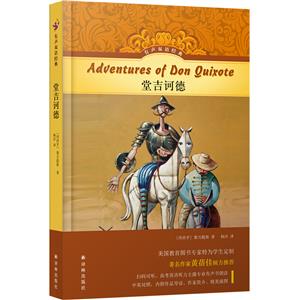-
>
考研英语背单词20个词根词缀
-
>
西班牙语词根宝典
-
>
美国K-12原版语文课本--初中·下(全12册)
-
>
流浪地球刘慈欣
-
>
西南联大英文课 轻读礼盒版
-
>
英语大书虫世界经典名译典藏书系:中国人的精神 (英汉对照)(精选权威版本)
-
>
许渊冲译唐诗三百首:汉文·英语
有声双语经典:堂吉诃德 版权信息
- ISBN:9787544783712
- 条形码:9787544783712 ; 978-7-5447-8371-2
- 装帧:一般胶版纸
- 册数:暂无
- 重量:暂无
- 所属分类:>>
有声双语经典:堂吉诃德 本书特色
译林“有声双语经典”原版引进美国教育专家特为学生编写的英语名著,精选贴近中国学生英语习得水平的经典作品。丛书甄选优质中文译本,配以导读、作家作品简介和插图,并聘请资深高考听力卷主播朗读英语有声书。有声书播放平台操作便捷,只需扫描书中二维码,即可收听、下载。丛书选目涵盖各国经典文学作品,让孩子在阅读中提高文学鉴赏能力和英语听读能力。著名儿童文学作家黄蓓佳长文导读推荐。 作为文艺复兴时期的现实主义巨作,《堂吉诃德》在经过近四百年的流传后,已成为世界文学宝库的一颗明珠。游侠骑士堂吉诃德和他的仆从桑丘??潘沙一道在外行侠仗义,践行着自己的理想主义,经历了种种荒诞不经之事,在令人发笑的同时又非常引人深思。如今,堂吉诃德的理想主义光辉在种种改编后的音乐剧、影视剧中焕发出了新的活力,激励着现代的人们继续追寻并坚持内心的信仰与美好。
有声双语经典:堂吉诃德 内容简介
在本书中,没落乡绅堂吉诃德因痴迷骑士小说,幻想以骑士之道行走世界,打抱不平。他与自己的仆从桑丘·潘沙一道先后几次外出,行侠仗义。他们一起经历了风车大战、狮群冒险、木马奇遇等种种奇特事件,☆终回到家乡,幡然醒悟。作者塞万提斯借种种荒诞不经之事,突显了堂吉诃德的理想主义光辉,也哀叹了信仰时代的终结。富于幻想的堂吉诃德和讲究实际的桑丘如今已经成为世界文学中的经典形象。
有声双语经典:堂吉诃德 目录
第1章 身披盔甲的骑士
第2章 堂吉诃德离家
第3章 多管闲事的代价
第4章 堂吉诃德和桑丘??潘沙的奇遇
第5章 更多奇遇
第6章 重回拉曼查
第7章 堂吉诃德得知他已出名
第8章 重新上路
第9章 林间骑士
第10章 狮群冒险
第11章 木偶戏
第12章 在公爵的宫殿里
第13章 木马奇遇
第14章 堂吉诃德建议桑丘
第15章 终身总督桑丘
第16章 岛上险象
第17章 桑丘的明智决定
第18章 骑士和侍从重聚
第19章 白月骑士
第20章 堂吉诃德病逝
Table of Contents
CHAPTER 1 A Knight in Armor
CHAPTER 2 Don Quixote Leaves Home
CHAPTER 3 The Price of Meddling
CHAPTER 4 Don Quixote and Sancho Panza
Have Some Strange Adventures
CHAPTER 5 More Strange Adventures
CHAPTER 6 Back to La Mancha
CHAPTER 7 Don Quixote Learns He Is
Already Famous
CHAPTER 8 On the Road Again
CHAPTER 9 The Knight of the Wood
CHAPTER 10 The Adventure of the Lions
CHAPTER 11 The Puppet Show
CHAPTER 12 At the Duke’s Palace
CHAPTER 13 The Adventure of the Wooden
Horse
CHAPTER 14 Don Quixote Advises Sancho
CHAPTER 15 Sancho, Governor for Life
CHAPTER 16 Danger at the Island
CHAPTER 17 Sancho’s Wisest Decision
CHAPTER 18 Knight and Squire Reunited
CHAPTER 19 The Knight of the White Moon
CHAPTER 20 Don Quixote’s Last Illness
有声双语经典:堂吉诃德 节选
第1章 身披盔甲的骑士 从前,有个人书读得太多,结果发了疯。他只读有关骑士的书,这正是问题所在。这些书讲述了身披盔甲的骑士的冒险之旅——他们与恶龙、怪兽、巨人、巫师,甚至其他骑士的奇遇。书里也谈情说爱,因为每个骑士都有一位梦中情人。 这人很快就对那些离奇的故事信以为真。有一天,他决定要当一名骑士,因为他想惩恶扬善。他独自在屋里头练习骑马比武。砰!砰!砰!就像书里的英雄似的,他总是赢。 这一切都发生在拉曼查省的一个小村庄里,该省位于西班牙中心。这个人同他的祖祖辈辈一样,一辈子都生活在这个小地方。他五十来岁,又高又瘦,留着撮小胡子。从没有人觉得他会做坏事,也没人觉得他不好,因为他是个体面人,是位完美的绅士。他家里还住着两个人,一个是他漂亮快活、天真无邪的侄女,约莫二十岁;另一个是胖乎乎的管家,大概四十岁,心地善良,对什么事情都很有主见。还有个男孩负责做家务。 这位绅士究竟姓甚名谁,尚不清楚。有人说他叫阿隆索?? 奎萨诺,但说不定姓奎萨达、克萨达或者克萨诺。他出身名门——这就是他被称为堂?? 阿隆索的原因。他继承了一小块土地,但其他的寥寥无几。当他病了,他卖掉好些良田,全部去买自己爱看的小说。 有一天,他展开做骑士的实际准备。家里头翻出来一套盔甲,是他曾祖父的。他又是清洗,又是抛光,还尽可能地把它修整好。头盔破烂不堪,得捆起来才行。他已经有了一匹马——虽然垂垂老矣,瘦骨嶙峋,根本算不上是匹马,但也算有个坐骑了。他花了整整四天工夫,寻思着给它取个好名字。就叫它罗西纳特吧,这名字可真不错!“罗西”是个西班牙词,意思是“马”或者“驮马”,“纳特”意思是“以前”。对大多数人来说,这个名字的意思是“这以前是一匹马”,但是对堂?? 阿隆索而言,它意味着骏马良驹,世间无有出其右者! 而他自己的名字,堂?? 阿隆索,对一位骑士来说还不够好。他改名成堂吉诃德——又添上“拉曼查的”几个字,这下大家伙儿都能知道他打哪儿来。拉曼查的堂吉诃德——不愧是位骑士的堂堂大名! 然而,他还是需要一位小姐,一位能让他魂牵梦萦,接受溃败敌人之效忠的小姐。没人知道他已坠入爱河,可他的确如此……他藏着掖着,似乎连那位女士都不知道他喜欢她!她是附近埃尔托巴索的一个农家女,毫不起眼、举止粗野、平淡无奇,名叫阿尔堂莎?? 洛伦索。他这辈子只见过她一次。在她一无所知的情况下,堂吉诃德宣称她是自己的“小姐”,管她叫埃尔托巴索的杜尔西内娅。跟其他名头一样,她的名字也是经过精挑细选的:它出自西班牙词语“杜尔塞”,意思是“甜美的”。 做好准备后,堂吉诃德满意极了。 CHAPTER 1 A Knight in Armor Once, there was a man who went crazy from too much reading. He only read books about knighthood; that was the problem. Those books told about the adventures of knights in armor—their fantastic encounters with dragons, monsters, giants, wizards, and even other knights. There was also talk of love, because each knight had a lady of his dreams. Soon the man came to believe that all those fantastic tales were true. One day, he decided to become a knight, for he wanted to right all that was wrong in the world, and punish evil. Alone in his room, he practiced jousting. Wham wham wham! Like the heroes in his books, he always won. All this happened in a little village in a province called La Mancha, in the heart of Spain. The man had lived in the same place all his life, as his parents and grandparents had before him. He was about fifty, tall and thin, and he had a small beard. No one would ever expect anything bad from him or think anything wrong about him, for he was an honorable man, a perfect gentleman. Two other people lived in his home; they were his pretty, cheerful, innocent niece, about twenty, and his plump housekeeper, about forty, who was a good, friendly soul, with strong opinions about everything. A boy did chores around the house. It is not clear what the gentleman’s real name was. Some think it was Alonso Quixano, but the last name could have been Quixada, Quesada, or Quexana. He came from a respectable family—that’s why he was called Don Alonso. He had inherited a little land, but very little else. When he became ill, he sold many acres of good farmland to buy more of his favorite books. One day he began the actual preparations to become a knight. Somewhere in the house there was an old suit of armor that had belonged to his great-grandfather. He cleaned it, polished it, and fixed it up as best he could. The helmet was in such bad shape that it had to be tied together. A horse he already had—old and bony, not much of a horse, but a mount nonetheless. He spent four whole days thinking of a good name for his horse. It would be Rocinante. And what a good name it was! Rocín is a Spanish word that means “nag” or “workhorse”; and antes means “before.” To most people, the name means “This was once a horse,” but to Don Alonso, it meant a steed above and beyond all other horses in the world! His own name, Don Alonso, didn’t seem good enough for a knight. He changed it to Don Quixote, and added de la Mancha so everyone would know where he came from. Don Quixote de la Mancha. What a fine-sounding name for a knight! But he still needed a lady, a lady to dream about, a lady to receive homage from his defeated enemies. No one knew he was in love, but he was ... so secretly, it seems, that even the lady herself didn’t know he liked her! She was a farm girl from nearby El Toboso, and she was plain, rough, ordinary. Her name was Aldonza Lorenzo. He had seen her only once in his life. Without her knowledge, Don Quixote pronounced her his “lady” and called her Dulcinea del Toboso. Her name, like the others, was well chosen: it comes from the Spanish word dulce, which means “sweet”. Don Quixote was very pleased with his preparations.
有声双语经典:堂吉诃德 作者简介
塞万提斯(Miguel de Cervantes Saavedra,1547—1616)是西班牙文艺复兴时期伟大的小说家、剧作家和诗人。他出身贫寒,自童年起便过着颠沛流离的生活,做过多种底层工作,生活的不幸加深了他对劳苦人民的认同,也成了他写作的灵感来源。他分别于1605年和1615年创造出脍炙人口的传世巨作《堂吉诃德》的上下卷,取得了巨大成功,但并未改善自己的贫困状况,☆终于1616年在贫病交加中溘然长逝。
- >
有舍有得是人生
有舍有得是人生
¥25.7¥45.0 - >
小考拉的故事-套装共3册
小考拉的故事-套装共3册
¥36.7¥68.0 - >
随园食单
随园食单
¥16.4¥48.0 - >
中国人在乌苏里边疆区:历史与人类学概述
中国人在乌苏里边疆区:历史与人类学概述
¥21.6¥48.0 - >
二体千字文
二体千字文
¥14.0¥40.0 - >
诗经-先民的歌唱
诗经-先民的歌唱
¥14.5¥39.8 - >
姑妈的宝刀
姑妈的宝刀
¥15.7¥30.0 - >
【精装绘本】画给孩子的中国神话
【精装绘本】画给孩子的中国神话
¥18.6¥55.0
-
茶花女
¥5.2¥12 -
巴黎圣母院
¥5¥15.5 -
理想丈夫
¥11.1¥28 -
名著名译英汉对照读本马克.吐温短篇小说选
¥15.4¥28 -
浮生六记(汉英对照)
¥18.6¥65 -
英汉典藏-沙与沫
¥9.3¥21.8
汉代农业-早期中国农业经济的形成
¥13.0¥20.0月背征途:中国探月国家队记录人类首次登陆月球背面全过程
¥52.9¥88.0雍录--中国古代都城资料选刊/[宋]程大昌撰 黄永年点校
¥32.5¥45.0四书五经 大字线装本(1-11)
¥1386.0¥1980.0管子:汉英对照(中国音乐轻松学)
¥68.6¥138.0

















